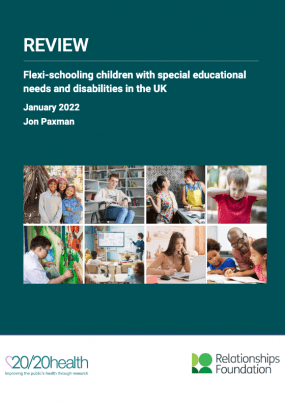Press Release: A shift in priorities within education is needed to support rising parental demand for flexi-schooling children with SEND.
A new report out today, published jointly by the Relationships Foundation and 20/20health, examines flexi-schooling regulation and practice in the UK and investigates whether such arrangements may be beneficial to children who have, or may have, special educational needs.
Flexi-schooling is an arrangement where a child is registered at school but attends only part of the time; the rest of the time the child is home-educated. In England and Wales, flexi-schooling arrangements can only be made at the request of a parent or carer with parental responsibility. In most cases, head-teachers alone hold the authority to accept or reject a request.
Commissioned by 20/20health, the report Flexi-schooling children with special educational needs and disabilities in the UK has a particular focus on children with SEND due to the permanent disadvantages they face in the school environment.
The report highlights widespread systemic failure in current SEND support. Pupils with identified SEND constitute around 15% of the school population yet account for nearly half of all permanent and fixed-period exclusions. Three-quarters of autistic children do not claim to feel happy and included at school, and a significant proportion of neurodivergent pupils are labelled ‘school refusers’ for their irregular attendance. In truth, many such children are crippled by stress and anxiety and lack the capacity to attend school.
Ofsted has highlighted ‘significant weaknesses’ in the SEND system and reported a disproportionate number of children with SEND being removed from schools by their parents to be home educated. Some parents would have preferred to flexi-school but found the school unwilling to accommodate the arrangement.
Mounting evidence suggests some children with SEND do not have the adaptive capacities to cope with full-time school, irrespective of any ‘reasonable adjustments’ the school may make in support of their education and inclusion.
The report makes clear that when a parent of a child with SEND requests a flexi-schooling arrangement, they typically request a SEND intervention out ofconcern for their child’s wellbeing, mental health and safety.
Requests are frequently denied.
The Relationships Foundation hopes the report will increase awareness of flexi-schooling and open up debate around its potential benefits for at least some children with SEND.
20/20health’s Jon Paxman, report author, said:
“Head-teachers need to consider whether granting a flexi-schooling arrangement for a child with known or suspected SEND may enable a less stressful and more manageable routine, better educational and behavioural outcomes, and — perhaps counter-intuitively — stronger inclusion.
Flexi-schooling may not always be appropriate, and it may only occasionally be requested by parents, but there needs to be greater awareness among schools, trusts and Local Authorities as to the potential benefits of flexi-schooling, and proper consideration of this ‘co-production’ arrangement as an early and pupil-centred SEND intervention.”
Julia Manning, CEO of the Relationships Foundation, said:
“It was important for us to understand why so many schools are reluctant to allow flexi-schooling, even for children with SEND. Evidence is only anecdotal, but some schools appear concerned about the complexity of flexi-schooling and the effect it has on attendance records and test results.
What is interesting is that this review examined multiple Ofsted reports of schools with significant numbers of flexi-schooled pupils and found no negative comment on ‘code C’ authorised absences, safeguarding, test results or inclusion issues. From this evidence it seems clear that flexi-schooling can contribute very positively to Ofsted inspection grades.
It is our hope that this report catalyses immediate action so more families have access to flexi-schooling arrangements from the moment their children need them. If as a society we are serious about lifelong education and equity, we need to ensure we enable all children to enjoy their school years. Flexi-schooling could be the game-changer to enable this for a significant number of children.”

